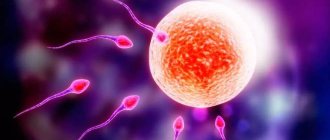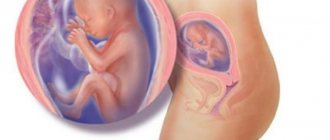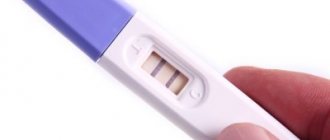Biochemical pregnancy - what is it?
Reproductologists have a definite opinion regarding this type of pregnancy: about 70% of cases of natural conception that occur are interrupted spontaneously 1-2 weeks after ovulation.
In other words, the process proceeds according to the standard scheme: the egg is fertilized by a sperm, then it moves to the uterus, the formed fertilized egg is attached to its wall - and that’s all. Menstruation begins.
As a result, the woman has no idea about pregnancy at all, and the only possible cause for temporary concern is the manifestation of the onset of menstruation in a slightly more intense form.
Statistics for IVF are slightly different, here doctors give 50% that cryopreservation will be successful, and the remaining half is attributed to other reasons. In an effort to get pregnant, a woman tirelessly listens to herself, waiting for signs to appear that meet her expectations. In fact, such patients became the reason for the emergence of the very concept of BCB, and it is they who are called its original discoverers.
How to cope with a biochemical pregnancy?
Physical recovery will not take too long
As noted earlier, in this condition, miscarriage occurs early and therefore has little impact on the woman's body. It is mainly mistaken for the late onset of menstruation. However, after a chemical pregnancy, bleeding is less heavy than usual. It may also be accompanied by cramps, but recovery occurs quickly.
It's normal to feel upset
Most women never find out that they have had a very early miscarriage. However, with the availability of highly sensitive pregnancy tests, it is possible to know when a chemical pregnancy occurs. Finding out that you've suffered a miscarriage can be devastating, especially if you were looking forward to the birth of your baby. If you are experiencing feelings of grief over a loss, you can seek help from support groups or your partner. You can also talk to your family and close friends. This can greatly help you get through this period.
Get treatment if needed
Because most chemical pregnancies go undetected, very few people actually undergo treatment. It is enough to lead a healthy lifestyle and you can have children in the future, even without receiving treatment after a biochemical pregnancy. If you are at risk for this condition, you may want to seek help from your doctor to monitor your hCG levels. If it doesn't decrease, you probably won't have a miscarriage, which could lead to health complications. Your doctor should monitor your condition closely for several months after a chemical pregnancy.
Prepare for a new pregnancy
You can get pregnant immediately after a biochemical pregnancy. There is no medical problem that prevents you from conceiving again. It does not affect a woman's fertility and ovulation continues as usual. In addition, the next cycle may be longer than the previous one.
There is actually no way to prevent chemical pregnancy. This is due to the fact that its causes are beyond our control. Most are caused by genetic problems in the embryo and therefore cannot be prevented. However, minor lifestyle changes can help prevent any potential miscarriages in the future. Eating healthy and avoiding the use of any drugs can help maintain a healthy pregnancy.
(1
ratings, average:
5.00
out of 5)
Many people have heard about biochemical pregnancy. But only some people know what this phenomenon is. Doctors say that it can occur in almost every third woman of childbearing age, sometimes several times. Biochemical pregnancy or BCP - what is it?
In short, biochemical pregnancy is a process that does not develop and is interrupted on its own too early. Its beginning is quite normal, but it is doomed and cannot continue. After fertilization by a sperm, the egg moves through the female reproductive tract, reaching the uterine cavity at the appointed time. The fertilized egg is fixed in the uterine endometrium, but then, instead of developing further, it is soon rejected and excreted from the body with bloody discharge.
Approximately 2 weeks after conception, a miscarriage occurs (almost immediately after implantation). At this time, neither a gynecologist, when examining a woman in a chair, nor an ultrasound diagnostic doctor can diagnose pregnancy, because the future embryo is still too small. And this is precisely what distinguishes biochemical pregnancy from clinical pregnancy. If a gynecologist or ultrasound specialist detects a fertilized sac and determines the pregnancy with its estimated term, then if terminated it is already a miscarriage.
Symptoms
Doctors diagnose BCB in patients on average in 35% of cases. It will not be possible to determine BCB using ultrasound diagnostics, in addition, a standard gynecological examination will also not give results - both methods do not reveal characteristic changes at such an early stage.
When it comes specifically to IVF, as the expectation of pregnancy (here it makes sense to add rather about excessive expectation), women with a day of delay almost completely “get into character.”
Women observe almost all the characteristic manifestations of pregnancy at once, namely:
- altered condition of the mammary glands (increased sensitivity, soreness);
- mood changes and irritability;
- weakness, dizziness, drowsiness;
- changes in taste preferences and appetite, gastrointestinal disorders (constipation, diarrhea, vomiting).
Often the listed symptoms of BCB are the result of excessive expectations, suspiciousness, self-hypnosis or an unsuccessful “joke of nature” - the question, again, is not completely clear.
Increased bleeding during menstruation, a slight delay (up to a week), pain - these symptoms indicate an early termination of pregnancy.
Causes of BCB during natural conception and IVF
Let us remind you that statistics say that 70% of conceptions end this way - it is a law of nature and it is useless to argue with it. This is due to the non-viability of germ cells. Considering the causes of BCB after cryotransfer, they are as follows:
- immune and autoimmune factors;
- hormonal imbalance, often a deficiency of progesterone in the body;
- the presence of blood diseases, for example, thrombophilia;
- the presence of chromosomal abnormalities that were not identified during the examination.
Causes
Biochemical pregnancy often occurs due to internal pathologies of the woman or embryo.
The occurrence of spontaneous miscarriage up to 2 obstetric weeks during natural fertilization often becomes the cause of the presence of:
- immune or autoimmune pathologies of a woman, leading to the rejection by the leukocyte system of an embryo foreign to the female body;
- hormonal problems associated with insufficient progesterone in the body;
- blood diseases;
- tendency to thrombosis;
- genetic abnormalities of the fetus incompatible with later life.
A miscarriage that occurs up to 2 weeks after IVF is in most cases caused by hormonal disorders of the embryo. The second reason for what happened is the chronic pathologies of the expectant mother (endocrine or genetic).
In addition, the basis for the development of BD may be:
- endometrial hyperplasia;
- very high level of progesterone in a woman’s blood;
- previous ovarian hyperstimulation.
There is a high probability of biochemical pregnancy in women:
- those who have previously encountered the problem of early spontaneous miscarriage or have had an abortion;
- those suffering from bad habits, in particular smoking;
- having endocrine chronic pathologies;
- working in enterprises with harmful or dangerous working conditions;
- forced to lift heavy objects during work;
- often in stressful situations.
In the event of a single biochemical pregnancy during natural conception, its causes are not established. The need for a thorough examination of the body arises only in the case of a constantly recurring pathology, which suggests that the woman may have possible infertility, autoimmune or genetic abnormalities.
A single case of BB during IVF requires more careful preparation for the next protocol. The doctor may also advise clients to resort to ICSI and PIXI techniques, which prevent the transfer of non-viable embryos.
What hCG is for bhb
Such a short period of time, which is relevant for the possible detection of BCB, an attempt to establish it using ultrasound or through a medical examination by a gynecologist, we repeat, is impossible. A blood test for hCG will help clarify the situation, and it is taken already on the 10th day after embryo transfer, and in the case of natural conception, on the second day after the delay.
The levels of the hormone in the blood of a pregnant woman change immediately after conception, and the gradual development of the fetus leads to an increase in the concentration of the hormone in the blood. In a normal course, the hCG level will be at least 10 mU/ml and will double every 2 days. A result of about 5-6 mU/ml with a downward trend will indicate HD.
Using a highly sensitive pregnancy test, sometimes with BCB it shows a positive result, although in most cases it is still negative.
Main signs and symptoms of HD
For some women, miscarriage during the early stages of fertilization goes unnoticed, especially for those who are not planning a pregnancy. In most cases, biochemical pregnancy manifests itself as follows:
- Delay of menstruation by no more than a week.
- All the signs of normal pregnancy are present - a change in taste preferences, increased drowsiness, and digestive system upset.
- Bloody discharge during menstruation is more abundant than usual.
- Accompanied by pain.
The hCG level in the blood will begin to change towards a decrease after the failure of the fertilized egg.
Is treatment necessary?
In this case, the most correct formulation is not the need to treat the disease, but rather the need to eliminate those causes that act as an obstacle to the normal onset and development of pregnancy.
Doctors recommend being examined, especially if a woman has two BCBs in a row. If we are talking about a one-time result, it is not scary and does not at all indicate a problem with the possibility of a normal pregnancy in the future.
BCB, or rather its completion, unlike a miscarriage during an ordinary physiologically normal pregnancy, does not require a curettage procedure with subsequent restoration.
BCB itself does not require drug treatment, since the embryo leaves the body with menstrual blood and the endometrium, which does not become a “shock” for the body.
Prevention
Biochemical pregnancy does not harm the woman’s body and is most often a one-time pathology.
In order to prevent this condition, it is recommended to carry out the necessary preparation before conceiving a child, including:
- mandatory testing;
- consultation and examination with a gynecologist and endocrinologist;
- giving up existing bad habits;
- stopping taking medications incompatible with pregnancy.
Equally important is:
- normalization of a woman’s sleep and wakefulness patterns;
- nutritious nutrition, allowing the body to restore strength and replenish the necessary vitamins and microelements;
- taking folic acid and drugs containing iodine;
- moderate physical activity.
It is best to plan the next conception no earlier than 2-3 months after a biochemical pregnancy. It is most important to follow this rule when preparing for the next IVF procedure.
In fact, a woman’s body becomes ready for conception already in the next menstrual cycle, but doctors strongly recommend taking a break to allow the body to restore lost strength.
Biochemical pregnancy is terminated almost immediately after embryo implantation
The subsequent IVF protocol may use frozen material or require the collection of additional eggs. In the case of ovarian hyperstimulation, the next replantation is carried out only 2-3 months after the removal of the eggs.
Before a new replanting, the following is additionally carried out:
- study of the compatibility of the chromosome set of a pair;
- MAP test (male);
- coagulogram (indicated if a woman is prone to thrombosis);
- calculation of the karyotype of the introduced embryo.
The likelihood of a biochemical pregnancy will also be prevented by the use of the ICSI method, during which a healthy fertilized egg is injected directly into the uterine cavity, or PICSI, in which all sperm taken are additionally examined for the presence of genetic abnormalities.
Biochemical pregnancy is not a pathology and does not require any treatment. A miscarriage that occurs in the 2nd week of pregnancy does not pose a danger to the female body and often goes completely unnoticed during natural conception.
Unfortunately, a biochemical pregnancy that has begun cannot be stopped by taking any measures to preserve the embryo, since the process is considered irreversible and quite often occurs due to the genetic incapacity of the embryo.
In the absence of health problems, a subsequent intrauterine pregnancy can occur already in the next menstrual cycle, but for its successful course, doctors recommend that the couple take a 2-3 month break, allowing the expectant mother’s body to fully restore its strength.
The risk of a repeat biochemical pregnancy during IVF remains quite high, even despite additional research. Unfortunately, about 60% of all replantations do not take root. The use of PIXI and ICSI techniques increases the chance of a successful pregnancy, but cannot guarantee a 100% result.
When to start planning?
Planning a natural conception after BCB creates a question for patients regarding the timing - when to try again?
If eliminating the causes requires time and treatment, then, most likely, the pregnancy itself will have to be postponed. However, if BCB is not a permanent result in trying to conceive, then the decision regarding planning should be made by the couple themselves.
Progressive doctors recommend not to waste time; there is no waiting period as such. In the next cycle, the possibility of a successful normal pregnancy is allowed.
As for in vitro fertilization, you should act within the framework of the protocol agreed upon by your fertility specialist.
IVF and biochemical conception
The number of women with various reproductive pathologies is growing rapidly, which makes a technique such as in vitro fertilization popular. The principles of this method boil down to in vitro fertilization, followed by implantation of the embryo into the uterine body. According to gynecologists, during in vitro fertilization and for some time after it, a woman runs the risk of getting a biochemical pregnancy. Such risks are caused by:
- Hormonal support for the patient, which is mandatory during IVF for successful embryonic implantation into the uterine endometrium;
- Stimulation of ovulatory processes, which is considered a mandatory measure under the IVF protocol. This is necessary for the simultaneous egg maturation of several female cells. After their fertilization, the strongest and highest quality embryos are selected, which are placed in the uterine cavity;
- If a biochemical pregnancy was diagnosed during IVF, then the embryo transfer procedure can be carried out no earlier than three months later, during which the spouses need to be examined to determine the reasons for such an unsuccessful outcome of the procedure.
- But with a fixed biochemical type of pregnancy during the IVF process, the onset of a natural pregnancy in the next cycle is quite possible. Therefore, in such situations, experts recommend that couples do not wait three months before the next transplant, but try to conceive naturally, because after stimulation, the female body is set up for successful conception, gestation and delivery.
If this happened during normal conception, then in the next cycle it is likely that pregnancy will occur and be successfully maintained. Isolated clinical cases of biochemical pregnancy cannot be considered a pathology, and therefore there is no need for additional examination of spouses.
Bottom line
BCB itself is not a death sentence and does not have a special impact on the condition of the female body, unlike early miscarriage. Examination and treatment are required when BCB is frequently detected, but after that the likelihood of having a child is quite real.
It remains to add that, despite your own desire to become pregnant, you should “let off some steam” and not focus on yourself so much that you see pregnancy in any change in the state of the body.
If you went through IVF and this situation happened, tell us how long after BHB you became pregnant?
Why does preclinical spontaneous abortion occur?
It is impossible to say for sure what caused the spontaneous preclinical abortion, since each situation must be considered individually.
Factors that may affect the course of pregnancy during early IVF include:
- hormonal disorders;
- anomaly in the set of embryo chromosomes;
- disorders in the woman’s immune system;
- blood diseases;
- diseases of the female reproductive organs (endometrial hyperplasia, ovarian hyperstimulation, etc.);
- presence of bad habits.
Hormonal disorders are accompanied by low levels of progesterone. Its deficiency causes miscarriage, or spontaneous preclinical abortion. In such situations, doctors prescribe a drug containing this hormone.
Termination of pregnancy after IVF often occurs due to a violation in the genetic chromosome set.
After the process of implantation of the embryo into the uterus, the woman’s immune system may perceive it as a foreign body and try to get rid of it.
Some blood diseases lead to bleeding disorders. For this reason, the nutrition of the embryo is disrupted, which causes its death.










